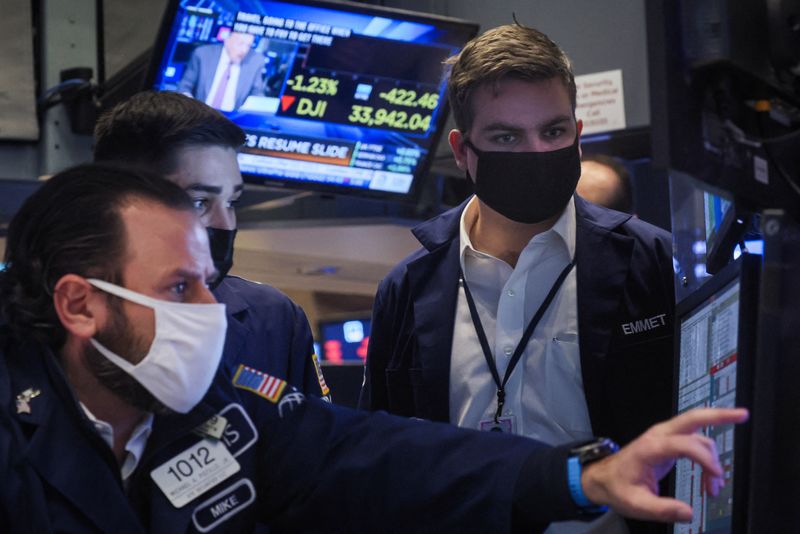By Peter Nurse
Investing.com -- The decision of Russian President Vladimir Putin to recognize two breakaway regions in Ukraine and send his troops in is having a widespread impact. Stocks are set to open lower, with eyes also on earnings from Home Depot (NYSE:HD) and Macy’s (NYSE:M). The ruble has seen volatile trading while crude and natural gas prices soar. CB confidence numbers are due for release, while the German Ifo surprised to the upside, for now at least. Here's what you need to know in financial markets on Tuesday, 22nd February.
1. Russia moves into eastern Ukraine
Tensions between the West and Russia saw a dramatic escalation late Monday after Russian President Vladimir Putin officially recognized two self-proclaimed republics in the east of Ukraine and ordered his forces to go into the regions.
This follows weeks of Russia massing troops on the Ukraine border as well as holding extensive military exercises in neighboring Belarus, prompting the U.S. to warn that an invasion of Ukraine was imminent.
U.S. President Joe Biden promptly issued executive orders prohibiting trade with the two breakaway regions, and further sanctions on Russia are expected to follow from the U.S. and its European allies.
Investors are now looking to see if Putin stops his troops in the east of Ukraine, or if an invasion of the whole of the country, including the capital Kiev, in his sights. The latter move would be sure to result in even more severe sanctions from the West, even if some European nations have been wary of the economic fallout they could face from penalizing Russia, especially given their reliance on it for gas imports.
2. Ruble hits 15-month low, then rebounds
The financial repercussions of Putin’s move into Ukraine are already being felt, with the Russian ruble sinking to a more than 15-month low on Tuesday before paring some losses.
At 6 AM ET, USD/RUB fell 0.9% to 79.0274, after climbing to 80.5825 in early trade, the pair’s strongest level since Nov. 2, 2020.
Helping the ruble climb off lows were comments from the Russian central bank, which said it was ready to take all necessary measures to support financial stability.
The central bank said banks would be permitted to use the market value of stocks and bonds in their portfolios as of Feb. 18, i.e., before the move into Ukraine, in earnings reports until October.
JPMorgan also downgraded its stance on Russian equities to "neutral" from "overweight", expecting further stock market declines in the near future. Russia may not pay out to foreign shareholders in the event of severe sanctions, the bank added.
3. Stocks set to open lower on Eastern European concerns
U.S. stock markets are set to open lower later, as U.S. investors return from the long weekend to try and digest the escalation of tensions in Eastern Europe.
By 6 AM ET, Dow Jones futures were down 55 points, or 0.2%, while S&P 500 futures were down 0.1% and Nasdaq 100 futures were down 0.5%.
The corporate earnings season is drawing to a close, and just under 80% of the around 400 of the companies listed on the S&P 500 have beaten analysts’ expectations, according to data from FactSet.
More results are expected today from the likes of Home Depot and Macy’s before the bell, and Caesars Entertainment (NASDAQ:CZR) after the close.
Elsewhere, eyes will be on General Electric (NYSE:GE) after the conglomerate’s stock slumped on Friday’s losses following a cautious outlook. HSBC (NYSE:HSBC) will also be in focus after the lender reported a near doubling of fourth quarter profit after tax to $2 billion, but also a $500 million charge, mostly due to its exposure to Chinese commercial real estate.
4. U.S. consumer confidence up next after German Ifo shines
The economic data slate in the U.S. Tuesday includes both services and manufacturing PMI numbers for February, which are expected to show a slight improvement from the previous month, and the CB Consumer Confidence release, also for February.
In Europe, the widely followed Ifo institute said German business morale improved in February across all sectors, rising to 98.9 from an upwardly revised 96.0 in January, the highest level since August last year.
"While such a strong reading would normally spread optimism, last night's Russia-Ukraine developments have probably made this prominent leading indicator rather backward-looking," ING economist Carsten Brzeski said, in a note.
5. Crude, European natural gas prices soar
Crude oil and European natural gas prices soared on the news of Russian troops entering eastern Ukraine after President Vladimir Putin officially recognized two breakaway regions in the east of the country as newly-formed republics.
Russia’s move is a dramatic escalation in its standoff with the West over Ukraine, and a conflict could threaten Russian gas supplies to Europe, about a third of which typically travel through pipelines crossing Ukraine. This could prompt Western European countries to seek alternative energy sources, including the purchase of crude from the global market.
Additionally, the U.S. and its European allies could well impose sanctions on Russia, with curbs to Moscow’s ability to trade in foreign currency likely to disrupt energy markets.
By 6 AM ET, U.S. crude futures were up 4.1% at $93.97 a barrel, while Brent crude futures were up 2.6% at $95.41 a barrel, having earlier climbed to its highest level since September 2014.
Gasoline RBOB Futures were up 3.8% at $2.9191 a gallon.
